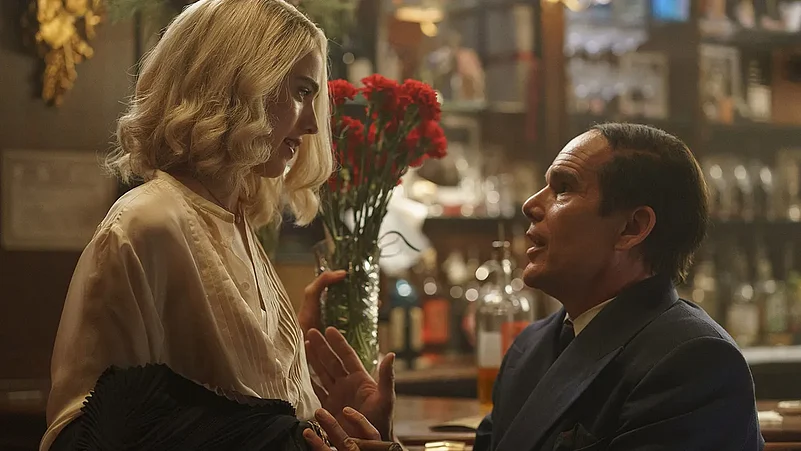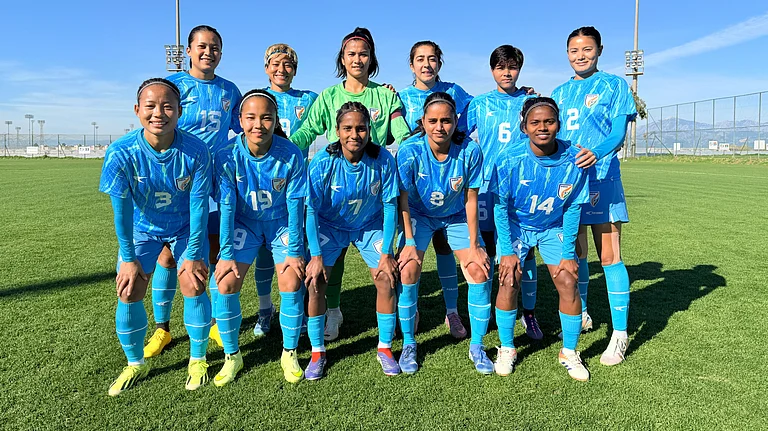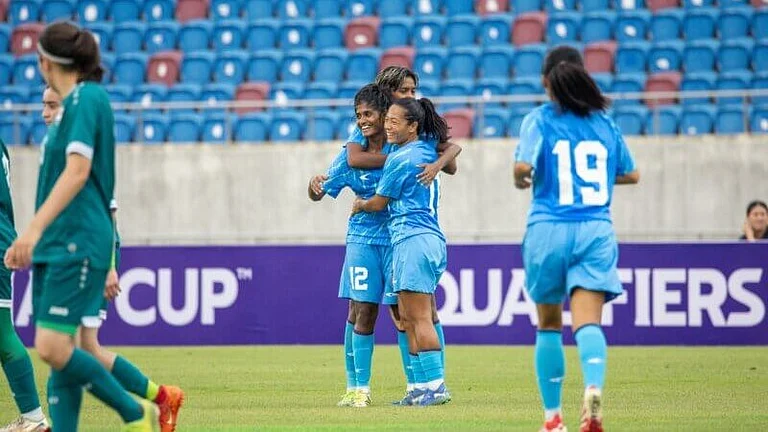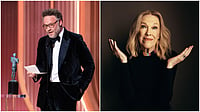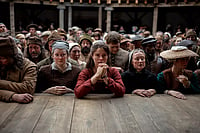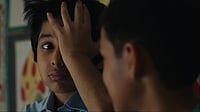
Summary of this article
Richard Linklater's Blue Moon premiered at Berlin Film Festival 2025, where Andrew Scott won the Silver Bear for Best Supporting Performance
The film marks the director's ninth collaboration with Ethan Hawke
The chamber drama recently screened at the 31st Kolkata International Film Festival.
Unfolding over a night at a New York restaurant, Richard Linklater’s Blue Moon sifts through the cracks in the legendary Broadway partnership between lyricist Lorentz Hart and composer Richard Rodgers. The year is 1943. Rodgers has stopped working with Hartz (Ethan Hawke) and just delivered a massive hit by pairing with Oscar Hammerstein on Oklahoma!. Before Blue Moon swings into the encounter between Hartz and Rodgers (Andrew Scott) on that night, the former’s storytelling keeps things lively and vigorously engaged.
Hawke is enthralling, sweeping you off in a storm of chatter as in the embittered quiet Hart buries. Much of Blue Moon rests on his ability to sell a gift of the gab. Hart is exuberantly chatty, concealing reserves of hurt, heartbreak and humiliation under layers and layers of spiel. Hart is doggedly charming, while masking the pity pits he's drowning in. Hawke dredges up a deep, desperate loneliness. It flickers at the edges of the constant, mirthful talk he rouses. He parries whenever he’s asked if he’s alright, what he’s really feeling like. But the vast, searching hollow in his gaze belies all that he stows away. There’s also Hart’s homosexuality, over which he was in denial. The times he worked in were proscriptive, Hart having to dress up his orientation with concerted proposals to women. In a latter conversation with Elizabeth (a riveting, canny Margaret Qualley), an aspiring theatre designer whom he adores, he gets all righteously riled up the minute she flags her mother’s suspicion of him being gay. In an earlier scene, Hart proclaims, “To be a writer, you have to be omnisexual”. What he genuinely believes, how much of an act he has to put up to survive in his times remain foggy. Linklater highlights Hart’s heartburn more in terms of Elizabeth’s romantic disinterest in him than queer loneliness.

This is a man crushed by the event of his long-time partner having found success without him, who may as well power ahead. As much as glad he can be of Rodgers, it’s eroded by his own vanity, human insecurities. A single thought looms persistently. Would he now be shunted entirely? He’s too conceited to utter it loud, but it hovers as he glides from one room to the other. The fear of his impending ruin, being rejected and unwanted, darts beneath every rant of his against the industry kowtowing to lazy templates.
Hart has lofty standards. He sees Rodgers as bending to a populist compromise. While the latter views no harm in it, reiterating it as equally difficult to rake in audiences, Hart stays stubborn in an ivory tower of judgement. But the stab of envy is deeply felt. He urges Rodgers not to create art that panders, but reach for more emotionally thorny terrain. Hart is openly dismissive of sentimentalism. He insists Rodgers can do so much more than pursue further mindless iterations of what’s emerged his biggest hit. To lean into such expectations would be to strip himself of the full spectrum of his own intelligence and talent. In Hart’s plea is the thinly disguised appeal for Rodgers to come back and work with him. Otherwise, shorn of him, Hart would become a nobody, forgotten entirely. He may not confess it but he’s wrecked at being cast aside, having his more tonally myriad art be seen as failure instead of Rodgers’ cheesy, upbeat emotional bait. Everyone, from Hawke to Scott, luxuriates in Robert Kaplow’s sparkling dialogues. Hawke dives in with unflappable energy right off the bat. He’s indefatigable, though at times, the physically impersonating tics are too diverting. There’s the bald cap, the studied hunch that threatens to take you out despite Hawke’s verbal and emotional litheness. But he’s too deft an actor to be sanded in by these.

As conscious Blue Moon is of its single-location setting, adopting a theatrical bent, Linklater fluidly wends through conversations across smaller spaces. At times, a restrictiveness does foist to the mise en scène. Hart is the guide, the thread. His sadness at a career clearly halted by Rodgers’ meteoric starburst of success limns the screen. Linklater fashions a pensive melancholy, thickly draped upon Hawke’s evocation. As much as Hart waives off others’ fleeting concerns, his deep-sunk resignation couldn’t be more amply evident. For every anecdote he takes great pleasure in recounting, it’s emblematic of his career’s future being suspended. Abandonment pushes at him, even as he cheerfully swats it away as long as he can. But it rears and pokes like an ugly, buzzing afterthought that just won’t taper off. Scott pops up briefly but leaves a bittersweet flare. He streaks through Rodgers’ combining high regard for his ex-partner and elevated unconcern. Rodgers can drum up just a shred of sympathy for the wretchedly inebriated Hart too caught up in sealed-off beliefs on art. The moment where the two discard polite evasion and attack each other with resentments and frustrations scores the film’s most heightened dramatic point.
In Blue Moon, Linklater isn’t chasing grand statements on art and evolving tastes. There are no overt gestures to dazzle, just a simple, undiluted weave through an individual’s deepest emotional trenches. Just the art of nimble conversation reveals its own thematic map. Every bracing turn in the dialogues brings you up close to Hart’s smashed ego, his overwhelming realization of his own redundancy. Linklater couldn’t have found a better partner than Hawke. The two have previously worked eight times and Hawke inhabits every crease beneath a confident Hart quip with wrenching buoyancy. This controlled, involving film invites you in without any flashy trick but total grounding flow.



